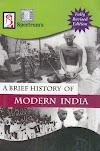Socio Religious Reform Movement
(Reform within Islam)
1. Aligarh Movement and Sir Syed Ahmad Khan
- Sir Syed Ahmad Khan was a loyal member of the judicial services of the government.
- After retirement he became the member of imperial legislative council in 1878.
- He also earned Knighthood title in 1888.
- He wrote an article 'Ashab-e-bagawate hind' (Causes of the revolt of 1857) in which he rejected the notion of the revolt as a Muslim conspiracy, instead he blamed East India Company's policy of aggressive expansion as the cause of the revolt.
- He advised British to appoint Muslims in administration to avoid such revolts in future.
- He believed that modern western education is essential for Muslims to compete with Hindus. He also said that the orthodox outlook of the Muslim will threaten their own future.
- In 1875, he opened Mohammadan Anglo-Oriental College. It imparted instructions on both western Arts and Sciences and Muslim religion. This college became the nucleus for the creation of Aligarh Muslim University in 1920.
- Sir Syed Ahmad Khan condemned polygamy, purdah system, slavery, piri-muridi (Guru-Shishya parampara) and he advocated education for Muslim women also.
- He propagated his ideas through his magazine 'Tahzib-ul-Akhlaq' (improvement in manners and morals).
2. Deoband School (Darul Uloom) at Saharanpur, UP
- It was a revivalist movement which stressed on traditional Islamic learning.
- It was founded in 1866 at Deoband by Mohd. Qasim Wanotvi and Rashid Ahmad Gangohi.
- It carried two objectives -
- Propagating the pure teachings of Quran and Hadis among the Muslims.
- Keeping alive the spirit of Jihad against the British authority.
- In 1885, it welcomed the creation of Indian National Congress (INC).
- In 1888, Deoband issued a fatwah (decree) against Sir Syed Ahmad Khan and his Organisation.
3. Ahmadiya Movement
- It was founded by Mirza Ghulam Mohmmad in 1889.
- He claimed that he was awaited Mohdi (Messiah) professised by the prophet.
- This movement was based on liberal principle and it believed in the universality of the religion like Brahmo Samaj.
- It opposed Jihad and stand for modern education among Muslims.
Previous Article - Reform within Hinduism
Next Article - Reform within Sikhism & Parsi
Notes on other subjects
Optional Subject
Note - This is my Vision IAS Notes (Vision IAS Class Notes) and Ashutosh Pandey Sir's Public Administration Class notes. I've also added some of the information on my own.
Hope! It will help you to achieve your dream of getting selected in Civil Services Examination 👍





0 Comments